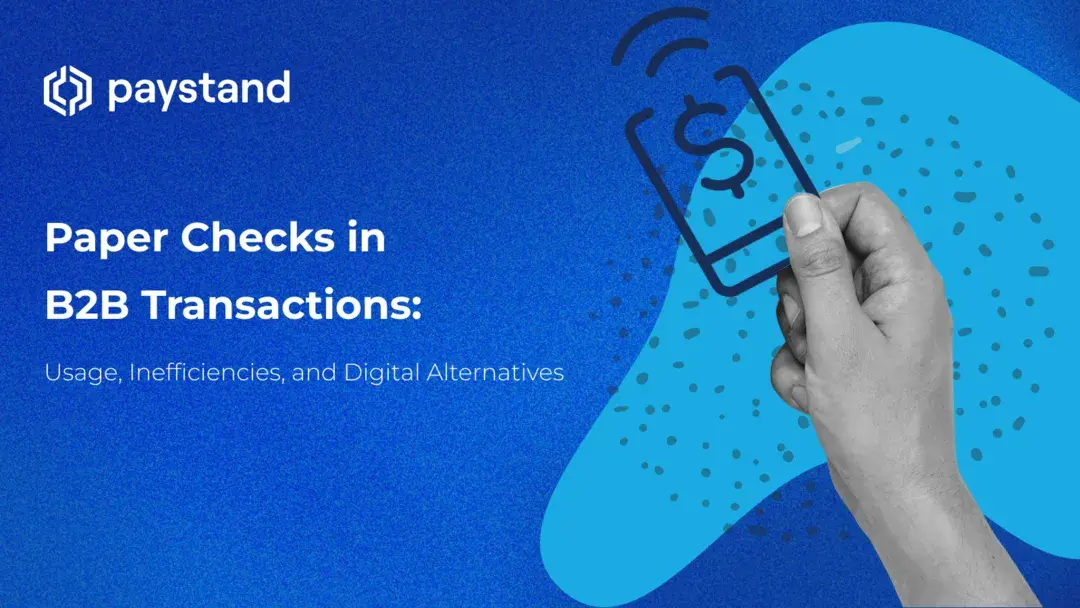Paper Checks in B2B Transactions: Usage, Inefficiencies, and Digital Alternatives

Despite the rise of digital payments, paper checks are still widely used in B2B transactions. While digital payment methods have gained popularity, paper checks still hold a strong position in specific industries and financial scenarios. Understanding the intricacies of paper checks is essential for businesses aiming to optimize their payment processes.
Online payment systems offer convenient and secure ways for businesses to accept customer payments online. Although these systems charge a transaction fee, they can provide features like secure payment processing, fraud protection, and easy integration with e-commerce platforms.
By understanding the costs and inefficiencies of paper checks and exploring alternative payment options, businesses can optimize their payment processes, improve efficiency, reduce costs, and enhance their overall financial operations.
What is a Paper Check?
A paper check is a written, dated, and signed instrument that directs a bank to pay a specific sum from the drawer's account to the payee.
Types of Paper Checks
- Cashier's Checks. They are guaranteed by the bank and used for large transactions.
- Certified Checks. Verified funds from the payer's account, ensuring the check will not bounce.
- Payroll Checks. Employers issue these to pay employees, though direct deposit has largely replaced them.
The Paper Check Payment Process
- Issuance. The payer writes and signs the check.
- Delivery. The check is sent to the payee, often via mail.
- Deposit. The payee deposits the check into their bank account.
- Clearing. The payee's bank requests funds transfer from the payer's bank.
- Settlement. Funds are moved from the payer's account to the payee's.
The Problems Associated with Using Checks
Processing paper checks can be costly and inefficient. Expenses associated with processing a single check can range from $4 to $20, depending on bank fees, labor costs, and postage. The annual cost can be significant for a business processing a high check volume. For example, a company would spend approximately $480,000 annually if it processes around 5,000 monthly checks.
Paper checks can also lead to operational inefficiencies. Manually processing checks can be time-consuming and prone to errors. Checks may be lost, damaged, or processed incorrectly, resulting in delays and financial losses. They can be a security risk, as they can be easily forged or altered.
Here are some additional problems associated with processing paper checks:
- Fraud. Paper checks are more susceptible to fraud than electronic payments, such as Automated Clearing House (ACH) transfers or credit/debit card payments. Fraudulent checks can be created or altered, leading to business financial losses.
- Slow processing times. Paper checks can take several days to clear, which can delay the availability of funds for businesses. This can be particularly problematic for businesses relying on cash flow.
- Environmental impact. Paper checks contribute to environmental waste, requiring paper, ink, and other resources. In an era of increasing environmental awareness, businesses may face pressure to reduce their reliance on paper checks.
Many businesses are transitioning to electronic payment methods, which offer several advantages over paper checks. Electronic payments are faster, more secure, and more efficient, and they can help businesses save money and improve their operations.
The Decline of Paper Checks in B2B Payments
Paper checks are quickly becoming a thing of the past as a traditional B2B payment method. Although half of all B2B payments are still made using paper checks, their use is declining due to several inefficiencies and high processing costs.
As a result, businesses are increasingly turning to digital alternatives for their B2B payments. Digital payments are faster, more secure, and more efficient than paper checks. They can be processed electronically, eliminating the need for manual labor and reducing the risk of fraud. Additionally, digital payments are typically less expensive than paper checks.
Which Alternative Payment Methods Are Out There?
- ACH Transfers. These are electronic payments that allow funds to be transferred between bank accounts. They are processed through the Automated Clearing House network, a secure and reliable system ensuring timely and accurate fund transfers. ACH transfers are generally safe and convenient, typically free or with low-cost fees.
- E-Checks. Electronic checks or e-transfers, are digital versions of traditional paper checks. They are processed electronically, allowing faster and more efficient fund transfers. To initiate an e-check, the payer provides the recipient with an electronic check representation, including the routing number, account number, and payment amount. The recipient then deposits the e-check into their bank account, where the funds are electronically transferred.
- Credit Card Payments. Credit cards allow cardholders to borrow money from the issuer to make purchases. The cardholder then repays the borrowed amount, plus interest, over time. Credit card payments are typically processed through a credit card network, such as Visa, Mastercard, or American Express. They are quick and easy but can be costly due to processing fees.
- Blockchain Payments. Platforms like the Paystand Bank Network enable secure, feeless transactions, streamlining B2B payments without needing paper checks or credit cards.
Why Do So Many Businesses Continue Using Checks?
Despite the rise of digital payments, checks remain a widely used payment method for businesses. There are several reasons for this:
- Convenience. Checks are a familiar and convenient way to pay for goods and services. Businesses that have used checks for years may be reluctant to change payment methods. Checks can be easily written and mailed, providing a paper transaction record.
- Trust. Checks are a trusted form of payment. When a business writes a check, it is essentially promising to pay the recipient. This trust is vital in business relationships, and building trust with new payment methods can be challenging.
- Security. Checks are a relatively secure form of payment. They are difficult to counterfeit and can be traced back to the issuer, making them safer than cash or credit cards.
- Cost: Checks are a cost-effective way to make payments. The cost of a check is typically lower than the cost of a credit card transaction or a wire transfer.
- Flexibility. Checks can be used to pay for a wide range of goods and services and to make payments to individuals and businesses that do not accept credit cards.
- Legal requirements. In some cases, businesses may be required to use checks for certain types of transactions. For example, some government agencies require businesses to pay by check.
While checks have some advantages, they also have some disadvantages. They can be slow to process, easily lost or stolen, and a hassle to write out and mail.
Despite these disadvantages, checks remain a popular form of payment for businesses. Their convenience, trust, security, cost-effectiveness, flexibility, and legal requirements make them valuable tools.
What You Can Do to Embrace Digital Payments?
To transition to digital payments, businesses can:
- Assess Current Payment Processes. Evaluate existing payment systems and identify areas for improvement.
- Select the Optimal Platform. Choose a digital payment solution that aligns with the business's needs.
- Educate Staff and Partners. Provide training and resources to ensure a smooth transition to digital payments.
- Continuously Monitor. Regularly review and optimize payment processes to maintain efficiency and effectiveness.
How To Create Exceptional Customer Experiences and Drive Cash Flow with Digital Payments?
Creating exceptional customer experiences and driving cash flow with digital payments involves several vital strategies businesses can leverage to enhance customer satisfaction and optimize financial performance.
- Seamless Payment Integrations
- Offer secure and convenient payment options.
- Ensure a smooth checkout process.
- Provide real-time payment status updates.
- Personalization and Customization
- Offer personalized payment methods and account info.
- Send tailored notifications based on customer history.
- Customize payment options for different customer segments.
- Mobile Payment Optimization
- Build a mobile-optimized website and payment system.
- Integrate mobile payment options for a smooth checkout.
- Optimize checkout for quick order completion.
- Security and Data Protection
- Enhance security measures to prevent fraud and protect financial information.
- Regularly update protocols and comply with standards like PCI DSS.
- Provide transparent privacy policies.
- Real-Time Analytics and Reporting
- Track payment trends, customer behavior, and conversion rates using analytics tools.
- Generate reports to identify improvement opportunities.
- Use data insights to optimize payment strategies and cash flow.
- Customer Support and Assistance
- Offer round-the-clock support for payment inquiries
- Provide several support channels
- Educate customers on digital payments
- Loyalty Programs and Rewards
- Create loyalty programs rewarding digital payments.
- Offer exclusive discounts, cashback, or points for each transaction.
- Personalize rewards based on purchase history for repeat business.
While paper checks have been a staple in B2B transactions, their inefficiencies and high costs make digital alternatives increasingly attractive. Businesses can benefit from adopting modern payment methods to reduce costs, mitigate fraud risks, and improve transaction speeds.
By transitioning to digital payment solutions, your business can streamline operations, reduce costs, and stay ahead in the competitive market. For more insights on modernizing your payment processes, download our eBook, Why B2B Companies Need to Adopt Blockchain Payments.







